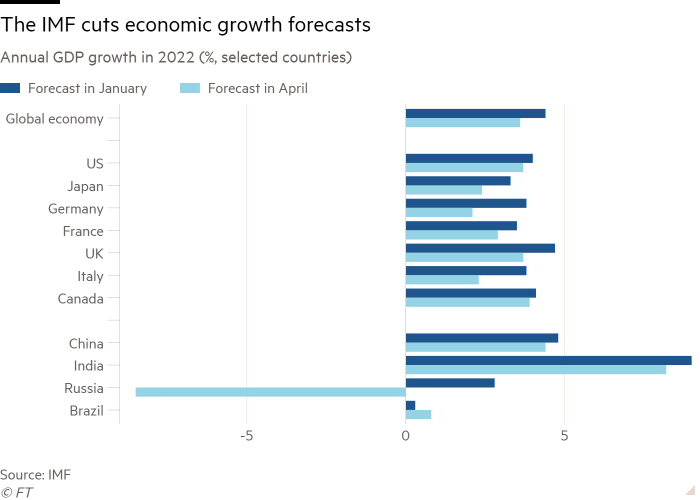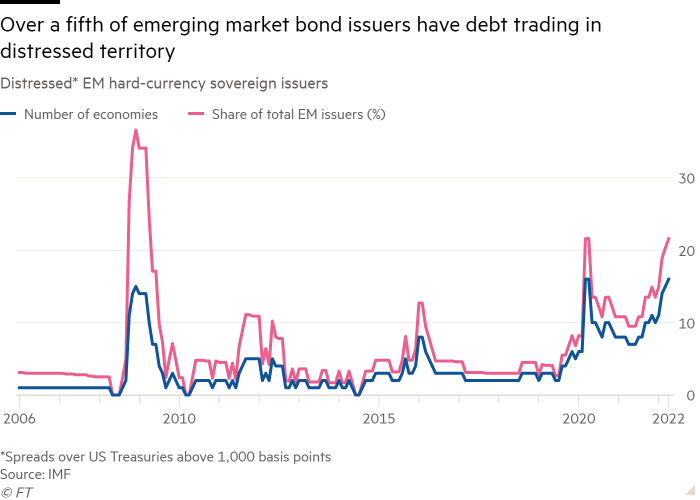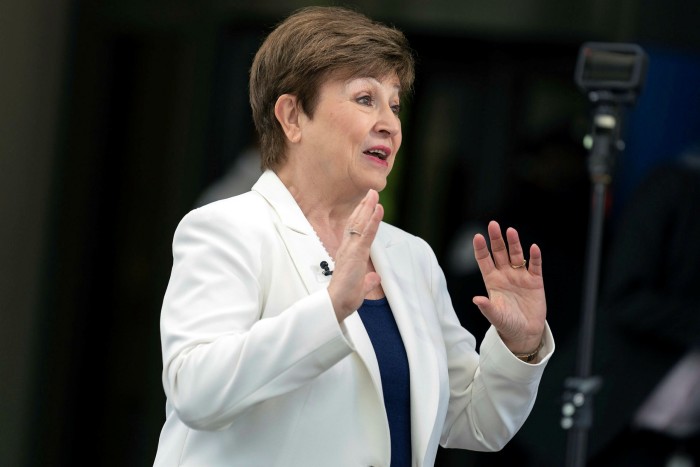As the Russian delegation prepared to speak at Wednesday’s G20 meeting, finance ministers and central bank governors from the US, EU, UK and Canada got up and walked out.
They did not stay to listen to what Russian finance minister Anton Siluanov, who joined virtually, or his deputy Timur Maksimov, who was in the room, nor Elvira Nabiullina, the head of Russia’s central bank, had to say about the global economy.
Christine Lagarde tweeted a photo of these unlikely protesters in the cavernous atrium of the IMF’s HQ2 building. “We stand with #Ukraine and against Russia’s war of aggression,” the president of the European Central Bank said.
Vitriolic language from normally mild-mannered finance officials such as US Treasury secretary Janet Yellen, who condemned Russia’s “illegal, unprovoked war against Ukraine”, highlights how the invasion dominated this week’s spring meetings of the IMF and World Bank in Washington.
Kristalina Georgieva, IMF managing director, said on multiple occasions that the invasion was a “massive setback” for the global economy, as the fund slashed forecasts for 2022 from the 4.4 per cent estimated as recently as January to 3.6 per cent.

The effect of the war in Ukraine in raising food and energy prices would create a “human catastrophe” in many poorer countries, said David Malpass, head of the World Bank, while the IMF’s fiscal and financial stability departments warned of debt distress among poorer countries as they face a perfect storm of increasing inflation, lower growth and higher US interest rates.
Ukraine is set to lose 35 per cent of output this year and appealed for more help with its budgetary crisis. It will need $5bn a month for the next three months just to keep the country running.
Georgieva urged richer countries to step up and provide the funding required. “Piling more debt on top of the ones they already carry in this environment of sharply reduced revenues and significantly increased expenditures [is] just not wise,” she said.

Even though Russia accounts for only 2.7 per cent of the global economy, it became clear this week that its re-emergence as a pariah nation would undermine global co-operation.
The G20, which has few formal rules and acts as a valuable talking shop among the world’s largest economies, was completely stymied by Russia’s continued participation and the walkout by western nations.
It was unable to publish a communique of its discussion, leaving Indonesia — which chairs the group this year — in the invidious position of trying to talk up the achievements of its presidency at a time of acrimony and walkouts.
This culminated in the most surreal moment during the post-meeting news conferences when Sri Mulyani Indrawati, Indonesia’s finance minister, admitted that discussions had been held “under challenging circumstances”, only to be contradicted by Febrio Kacaribu, head of the country’s fiscal policy agency, who said “the spirit of collaboration and multilateralism was really showing during the meeting”.
Few believe the G20 now lives up to its billing as “the premier forum for international economic co-operation”.
The G7 would like to kick Russia out of these discussions and issued a statement saying the US, Japan, Germany, France, UK, Italy and Canada “regret[ted] participation by Russia in international fora, including G20, IMF and World Bank meetings this week”.
Russia’s refusal to lie low also meant the IMF’s governing body, the International Monetary and Financial Committee, was unable to agree a communique.

The IMF managing director had little progress to demonstrate from the week’s discussions and negotiations. In Georgieva’s closing news conference, she talked of “very concrete takeaways of our meeting”, highlighting an agreement to establish a Resilience and Sustainability Trust at the IMF to help poor countries finance longer-term challenges, such as the transition to clean energy. The only problem with this was that the agreement to establish this financing mechanism was actually struck last October.
Instead of trumpeting the OECD’s 2021 global tax agreement in its statement to the IMF, the international organisation barely mentioned it because deadlines are already slipping.
The international community’s “common framework” to tackle debt distress by bringing together all public and private sector creditors barely functions because, as Georgieva said, “there are no clear, established processes and timelines”.
However, Georgieva spoke for many in saying that although the IMF could not publish statements that require consensus agreement, Russia’s invasion had increased, rather than diminished, the need for international co-operation in economic matters. “The overwhelming majority of the membership sees this crisis as proof that we have to co-operate, compare notes on policies [and] find ways in which we can act in solidarity,” she said.
The future of economic policymaking may lie in regional groupings for co-operation rather than global fora.
Pierre-Olivier Gourinchas, IMF chief economist, highlighted the consequence of such a move, saying in an interview with the Financial Times: “If we become a world of many different blocs, we will have to undo a lot of the integrated economies that we’ve built and supply chains that we’ve built . . . and build something else that is more narrow [and] smaller in scope.”
“There will be adjustment costs [and] there will be efficiency losses and that could lead to an increase in unit costs because things are not done as efficiently as before,” he added.
“If we are in a world in which we have different blocs, then I don’t exactly know how the [IMF] can function. Does it become an institution that works for one bloc but not the others? How does it work across different parts of the world? It is certainly not something that would be desirable on many, many fronts.”


